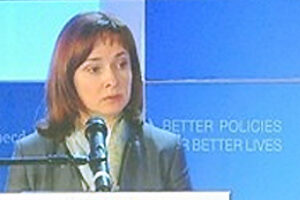Putin’s Thaw With U.S. Gives Russia Room to Phase Out Stimulus

(Bloomberg – bloomberg.com – Maria Levitov – November 18, 2015)
Reining in stimulus just became a lot easier for at least one of the world’s policy makers: Elvira Nabiullina.
Signs this week that Russia’s isolation in global politics may be coming to an end set off a rally in the nation’s assets as investors bet sanctions over Ukraine will get scaled back. That’s giving Nabiullina, the central bank governor, the space she needs to pull the plug on a program introduced a year ago to help companies meet external debt payments.
The governor said last week she saw no need to resume foreign-currency repurchase agreements due in one year, meaning that the $26 billion that matures between now and Aug. 5 can’t be rolled over. While Bank of America Corp. warned phasing out the facility may undermine a Eurobond rally after some of the cash was used to buy debt, the equation shifted as President Vladimir Putin and his U.S. counterpart Barack Obama looked poised to consider setting aside their differences over Ukraine to focus on fighting Islamic terrorists.
“A calming in geopolitical noise was the missing piece in the puzzle, which would certainly help the central bank’s policy-making backdrop,” Simon Quijano-Evans, the chief emerging-markets strategist at Commerzbank AG in London, said by e-mail Nov. 18.
With one less crisis program on her plate, Nabiullina can devote more of her attention to addressing the recession and inflation. Even after Bank of America analysts said the move posed risks to the developing world’s second-biggest Eurobond rally this year, yields on 30-year dollar bonds in U.S. dollars declined 28 basis points this week to 5.56 percent, the most among major emerging markets as geopolitics upstaged other drivers.
“The central bank would like to continue to unwind the emergency measures and any environment that would allow them to do so would be welcomed,” Steve Hooker, a money manager at Newfleet Asset Management in Hartford, Connecticut, who helps oversee about $12.5 billion of debt including Russian government Eurobonds, said by e-mail on Nov. 17. “Any easing in perceptions of political risk or the normalizing of Russia relations with the West would boost sentiment toward Russian assets.”
For Bank of America, dwindling support for Eurobonds from Russian banks means shorter-maturity debt due in 2023 might suffer more than the longer end.
Nabiullina’s decision is “marginally negative for the whole curve, but not to the point where we say let’s underweight Russia,” Vadim Khramov, an analyst at Bank of America in London, said by phone Nov. 16. Khramov recommends a “market weight” on Russian Eurobonds and favors notes due 2043.
Ready Cash
Russia’s loan program was designed to help Eurobond issuers weather sanctions that denied some of the nation’s biggest companies access to international capital markets. By making foreign-currency repos with one-year maturities available to local banks at interest rates ranging from 1.1 percent to 3.5 percent starting in November 2014, the government insured a source of ready cash for companies to keep up payments on foreign bonds. Lenders bought $26 billion in one-year repos through the last auction in August, central bank data show.
It worked. Foreign-currency deposits at Sberbank PJSC, the nation’s largest lender, soared 33 percent this year to almost $90 billion as of Oct. 1, underscoring ample liquidity at Russian banks a year after sanctions were expected to leave them short of dollars.
Bond Arbitrage
There was so much extra cash available banks ended up redeploying them into Eurobonds yielding three times more than the central bank’s borrowing rate. That drove returns of 19 percent for Russian Eurobonds this year, second only to Ukraine, according to data compiled by Bloomberg.
Meanwhile, the need to meet foreign debt maturities is less acute now than a year ago when the program was introduced: Eurobond maturities are set to drop to $16.7 billion in 2016 from almost $30 billion this year.
“We don’t see any need at this point to resume” the program, Nabiullina told reporters at the State Duma Friday. “Everything is fine with FX liquidity on the market.”
The central bank continues to provide one-week and 28-day foreign-currency loans and regarding one-year loans, policy makers are “watching the markets” in case the need arises again, Nabiullina said.
“The central bank can always restart the 12-month FX repos whenever it wants and it can reduce the maturity profile in the meantime,” said Quijano-Evans at Commerzbank. “It is quite a flexible instrument.”
Article ©2015 Bloomberg L.P. All Rights Reserved. Article also appeared at bloomberg.com/news/articles/2015-11-18/putin-s-thaw-with-u-s-gives-russia-room-to-phase-out-stimulus
[featured image is file photo]
